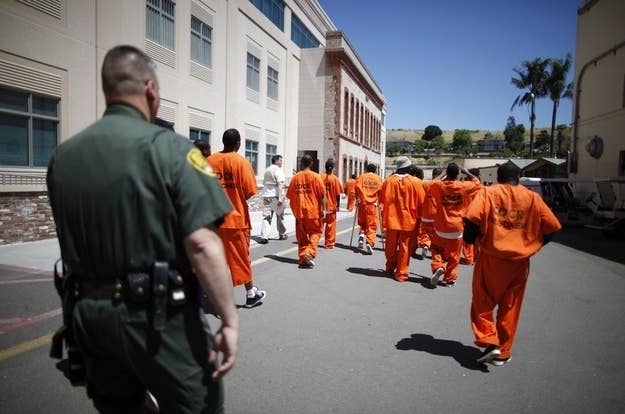
It is illegal in the United States for federal prisoners to go on the internet. Most prisoners who have been serving long sentences in prison have never been online. Some inmates have managed to go online through illegally smuggled cell phones. But most of them haven't tried out smartphones, apps, or instant messaging. Facebook, Twitter, and Yelp are vague concepts. The idea that apps can know where you are or remember your information sounds like sci-fi. They hear about these things from friends, television, and magazines, but it's hard to conceive what they are and how they have transformed the world.
Proponents say it's a matter of security; opponents say it is a major hurdle for successful reintegration once they are released. Some federal prisoners have been granted limited access to monitored text-only email with people on an approved contact list. But most state prisoners don't even have that.
What is it like to be a grown adult in 2013 and have no idea what the internet is? I asked some prisoners at California's San Quentin State Prison how they imagine it.
According to one inmate in his thirties who asked not to be named, "It's like pages that connect to other pages endlessly. I know [on Facebook] you can find someone if they list their high school or something, and click on it, but it doesn't make much sense. I've seen apps on the Ellen DeGeneres show. It's a button that leads you somewhere, like an internet page, but in a quicker way."
He has seen printouts from Facebook, since his friend outside set up a page on his behalf so high school buddies can send him messages. Sometimes he gets them in the mail.
A handful of San Quentin prisoners partook in the Last Mile program about the internet and startups. Through books, presentations, and printouts, they gained a theoretical understanding of the web, but not a practical one. While they still haven't been online, this basic understanding made it easier for them to articulate just how far off their first impressions were. Here's what they told me:
I've never seen the internet in person. I was locked up in 1997. CDs were a big deal. I knew the internet was called the information superhighway for a reason, but I had no idea how connected society really is through the internet.
I didn't understand how big and new it is. It was a global name that has changed the world.
I could imagine the information that the internet provided when it came to research, and that is how it existed in my mind, just as a tool. If you had asked me what a URL was, I would have just looked at you.
I imagined an app was a button you pressed on your phone with no clear conceptualization of what it really did.
—Tommy Winfrey, 35, serving 25 years to life; entered prison in 1997
I have seen the advertisements of both the internet and the apps on the television, but I never paid close attention about their usage. I did not consider their significance.
I was completely in the blind about the purpose. I thought they were just sites for people to socialize and spend their idle time.
—Jorge Heredia, 37; entered prison in 1998
I envisioned the web to be like this infinite space filled with information about everything under the sun.
I was confused about how you got from one piece of info to the next and I was clueless in terms of the lingo used to describe it all...
The technical aspects of it make me go, Hmmmm? I realize everything is getting faster and moving toward mobile, so I often wonder about who's doing all this stuff and where is it all taking place?
—Chrisfino Kenyatta Leal, 44; entered prison in 1994
